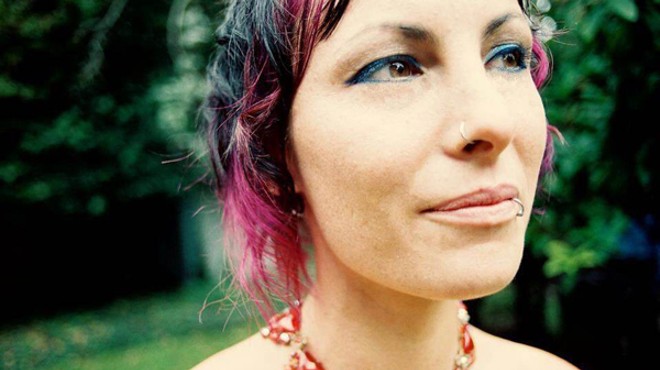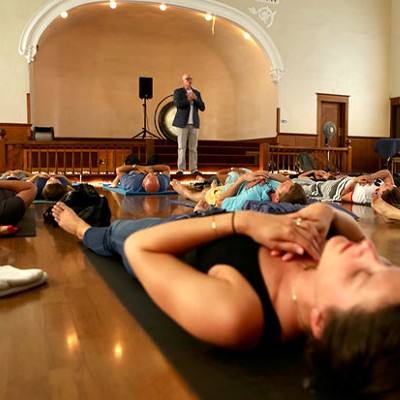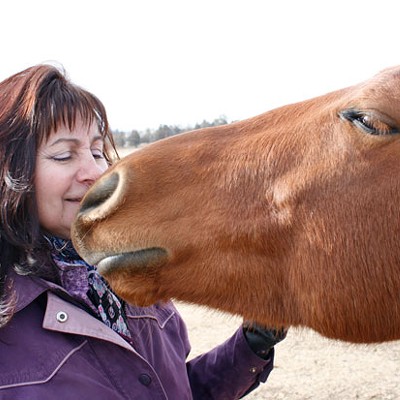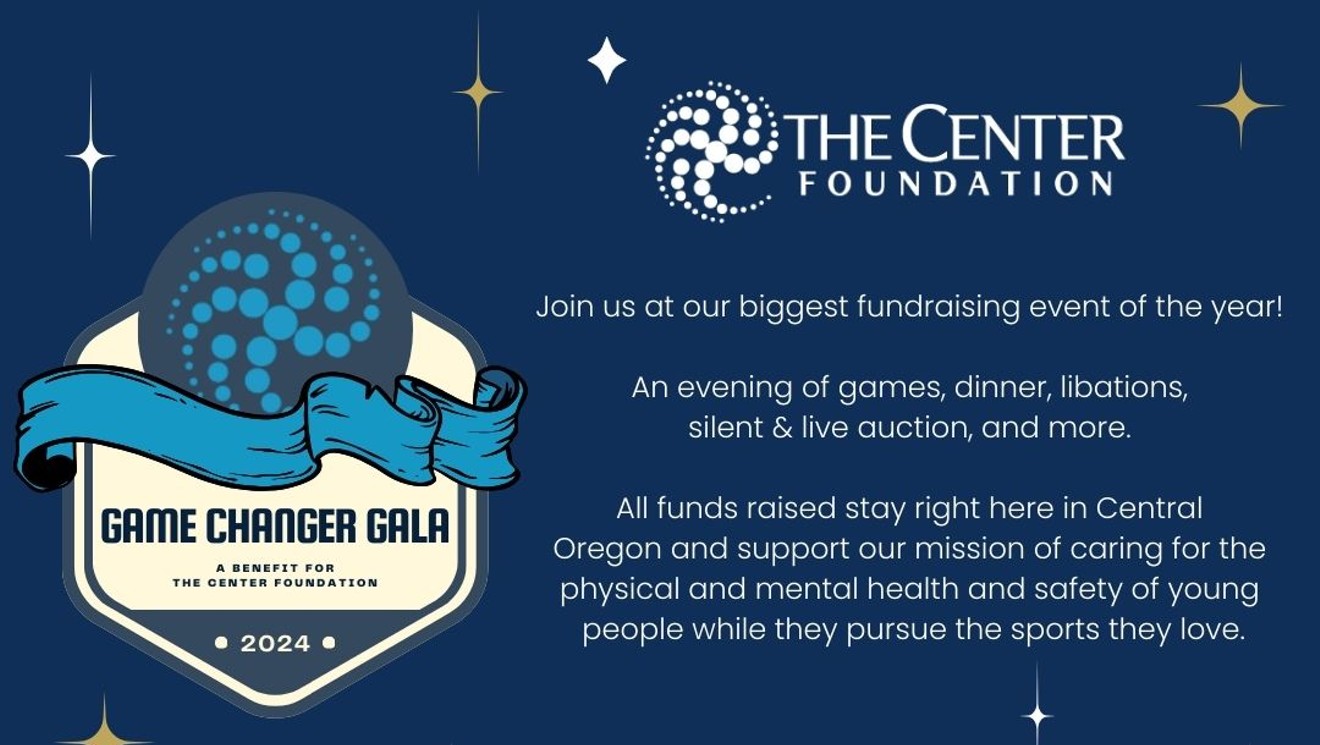[
{
"name": "Air - Ad - Rectangle - 2 pack - Inline Content - 1",
"insertPoint": "1/2",
"component": "16844684",
"requiredCountToDisplay": "6"
}
,{
"name": "Air - Ad - Rectangle - 2 pack - Inline Content - 2",
"insertPoint": "1/4",
"component": "16844686",
"requiredCountToDisplay": "20"
},{
"name": "Air - Ad - Rectangle - 2 pack - Inline Content - 3",
"insertPoint": "3/4",
"component": "16844687",
"requiredCountToDisplay": "17"
}
]
In this week's issue, we talked to a local cult survivor who recently spotted members of the Brethren (aka Jim Roberts Group), the cult to which she once belonged, in Bend. As part of that story, we also chatted with Portland-based therapist Kristi G. Erlich, LMFT, who was born into a cult and specializes in helping people recover from experience with cults and high demand groups. Our full conversation is below.
Source Weekly: What makes cults dangerous? Assuming they aren’t passing out poison Kool-Aid, what’s the harm?
Kristi G. Erlich: Cults and high demand groups are dangerous and harmful because they require individual loss of identity in favor of group imperatives. These imperatives, which often appear harmless or even meaningful on the surface, conceal agendas of power of one or a few. They slowly and systematically instill shame in the individual for thinking critically and aligning with or developing their own system of values.
SW: What makes a person vulnerable to the influence of a cult?
KGE: In a psychological sense, people who join cults in adulthood typically come from broken or abusive families or experienced some disruption in their individual identity development. They somehow missed learning a healthy balance between the internal dialogue, and external challenge to their thoughts, emotions and values, that shape the actions and directions they take in life. They may unconsciously seek to have their identities fully defined by an outside source, or to search for the functional family and community they never experienced in their early lives.
For those who are born and raised in a cult, the vulnerability to remaining influenced by the group lies more in the fact that they have never known how to think outside of the dogma and philosophy of that group. Either they have no "normal" to gauge their experiences against, so accept what they know without question, or the fear of attempting a life in "normal" society is emotionally paralyzing.
From the perspective of survival, people who leave cults often face difficulty gaining employment. They often have no skills, no education and no work history. Depression and anxiety are often factors, and are deepened by the inability to survive in the "real world." This is very often what drives people to either seek another group or to go back to their original group. This also one of the insidious ways that cults retain members—by keeping them socially, psychologically and financially dependent on the group.
SW: What lasting effects can cult membership have, even after leaving the group?
KGE: It is ironic that the very reasons that people seek out cults and high demand groups (alienation, loss of family and community, identity disruption), are also the experiences that become deepened and exacerbated by group participation. People, especially those who were born and raised in cults, feel a profound sense of alienation from others. They often have the internal experience that they simply don't fit in to the world at large. They often align and attach to others who, for other reasons, feel alienated or misfit. This is, in part, because they enter the "real world" with an ingrained and deeply internalized thought system and language that is outside the norm. They face some of the same challenges that immigrants face with enculturation and integration into a new world. It can take decades (if ever) to feel entirely assimilated.
Whether an individual was born and raised in a cult or joined as an adult, there is typically long-lasting trauma associated with any kind of group participation. They may have difficulty working collaboratively, speaking up in class, socializing in groups, etc. They suffer frequently from drug and alcohol issues stemming from social and general anxiety, and can be hyper-vigilant, distrustful and unable to form deep, lasting relationships. Often, they have no sense of what healthy intimacy looks and feels like. They either associate intimacy with emotional intensity, or are unable to reveal enough of themselves to form truly intimate bonds with others.
Finally, many people experience all manner of abuse in cults—sexual, psychological, physical, spiritual, emotional. These are complicated issues to heal from, even on their own. Add in the fact that they are (in a cult) mixed up with morality, purpose, social development, and financial survival and these issue become vastly more difficult to unwind in ourselves as we seek to heal. Profound shame is a common experience among cult survivors. The origins of that shame are difficult to identify when these issues are confounded, and therefore difficult to heal.
SW: What’s the best way to support someone who you believe may have joined a cult, but who isn’t interested in/ready to leave?
KGE: This is a difficult scenario for any family or friend. The "tough love" approach is often what drives people deeper into group/cult participation. Family and friends are eager to liberate their loved ones from these groups, but must not push too hard. Of course every person is different, but by and large the best approach is to remain a tether to the outside world, lovingly and gently. Be honest about your feelings, but not judgmental, and come from a very personal place, rather than a political or intellectual argument. For example, it would be much more effective to say "I miss you so much and am so sad you're not a part of my life anymore," than "you are getting involved in some evil, dangerous stuff and you should leave as soon as possible." Cults ALWAYS have arguments and structures in place to deal with outside detractors and they will stop at nothing to silence them to retain control over the individual.
Lastly, it may be necessary to enlist the help of a professional or close family/friend. It's critical that when we approach the individual that we are coming less from a reactionary place (for example, extreme fear for our loved one's safety). Having a trusted place to discharge some of our reactions, judgments and fear, can help us approach with more clarity, compassion and curiosity. In general, those things are going to be less off-putting to the individual
SW: What is your background with this issue?
KGE: I was born and raised in a cult that I defected from around the age of 17. My family was heavily involved and all suffered many abuses as a result. My parents, who were teens in the 60s and expecting a baby when they joined, were lured in by the promise of having a better relationship (which was failing) and having more control over their emotional reactions and lives, in general. They found family and community among the members that was unlike their own. They found purpose in helping humanity become better.
SW: Are you aware of much current cult activity in Oregon? What qualities about a place make it attractive to cult leaders?
KGE: I am aware of various cults in Oregon. They are sometimes masked by other organizations, like schools, drug treatment programs, or social welfare programs. Unsuspecting people avail themselves of their help or services and are unwittingly lured in slowly and methodically.
Cult leaders typically set up shop in areas where there are plenty of disadvantaged and disenfranchised people. They may also prefer locations that are somewhat remote or outside city limits in order to conceal their activities more easily. And, of course, it's much easier to locate in a community where religious freedom is supported.
SW: Anything you’d like to add?
KGE: If you hear yourself saying and/or thinking the same things over and over again, unquestioningly, it's time to step back and take a critical look at it, and/or enlist a friend to challenge you. Be open to feedback.
Source Weekly: What makes cults dangerous? Assuming they aren’t passing out poison Kool-Aid, what’s the harm?
Kristi G. Erlich: Cults and high demand groups are dangerous and harmful because they require individual loss of identity in favor of group imperatives. These imperatives, which often appear harmless or even meaningful on the surface, conceal agendas of power of one or a few. They slowly and systematically instill shame in the individual for thinking critically and aligning with or developing their own system of values.
SW: What makes a person vulnerable to the influence of a cult?
KGE: In a psychological sense, people who join cults in adulthood typically come from broken or abusive families or experienced some disruption in their individual identity development. They somehow missed learning a healthy balance between the internal dialogue, and external challenge to their thoughts, emotions and values, that shape the actions and directions they take in life. They may unconsciously seek to have their identities fully defined by an outside source, or to search for the functional family and community they never experienced in their early lives.
For those who are born and raised in a cult, the vulnerability to remaining influenced by the group lies more in the fact that they have never known how to think outside of the dogma and philosophy of that group. Either they have no "normal" to gauge their experiences against, so accept what they know without question, or the fear of attempting a life in "normal" society is emotionally paralyzing.
From the perspective of survival, people who leave cults often face difficulty gaining employment. They often have no skills, no education and no work history. Depression and anxiety are often factors, and are deepened by the inability to survive in the "real world." This is very often what drives people to either seek another group or to go back to their original group. This also one of the insidious ways that cults retain members—by keeping them socially, psychologically and financially dependent on the group.
SW: What lasting effects can cult membership have, even after leaving the group?
KGE: It is ironic that the very reasons that people seek out cults and high demand groups (alienation, loss of family and community, identity disruption), are also the experiences that become deepened and exacerbated by group participation. People, especially those who were born and raised in cults, feel a profound sense of alienation from others. They often have the internal experience that they simply don't fit in to the world at large. They often align and attach to others who, for other reasons, feel alienated or misfit. This is, in part, because they enter the "real world" with an ingrained and deeply internalized thought system and language that is outside the norm. They face some of the same challenges that immigrants face with enculturation and integration into a new world. It can take decades (if ever) to feel entirely assimilated.
Whether an individual was born and raised in a cult or joined as an adult, there is typically long-lasting trauma associated with any kind of group participation. They may have difficulty working collaboratively, speaking up in class, socializing in groups, etc. They suffer frequently from drug and alcohol issues stemming from social and general anxiety, and can be hyper-vigilant, distrustful and unable to form deep, lasting relationships. Often, they have no sense of what healthy intimacy looks and feels like. They either associate intimacy with emotional intensity, or are unable to reveal enough of themselves to form truly intimate bonds with others.
Finally, many people experience all manner of abuse in cults—sexual, psychological, physical, spiritual, emotional. These are complicated issues to heal from, even on their own. Add in the fact that they are (in a cult) mixed up with morality, purpose, social development, and financial survival and these issue become vastly more difficult to unwind in ourselves as we seek to heal. Profound shame is a common experience among cult survivors. The origins of that shame are difficult to identify when these issues are confounded, and therefore difficult to heal.
SW: What’s the best way to support someone who you believe may have joined a cult, but who isn’t interested in/ready to leave?
KGE: This is a difficult scenario for any family or friend. The "tough love" approach is often what drives people deeper into group/cult participation. Family and friends are eager to liberate their loved ones from these groups, but must not push too hard. Of course every person is different, but by and large the best approach is to remain a tether to the outside world, lovingly and gently. Be honest about your feelings, but not judgmental, and come from a very personal place, rather than a political or intellectual argument. For example, it would be much more effective to say "I miss you so much and am so sad you're not a part of my life anymore," than "you are getting involved in some evil, dangerous stuff and you should leave as soon as possible." Cults ALWAYS have arguments and structures in place to deal with outside detractors and they will stop at nothing to silence them to retain control over the individual.
Lastly, it may be necessary to enlist the help of a professional or close family/friend. It's critical that when we approach the individual that we are coming less from a reactionary place (for example, extreme fear for our loved one's safety). Having a trusted place to discharge some of our reactions, judgments and fear, can help us approach with more clarity, compassion and curiosity. In general, those things are going to be less off-putting to the individual
SW: What is your background with this issue?
KGE: I was born and raised in a cult that I defected from around the age of 17. My family was heavily involved and all suffered many abuses as a result. My parents, who were teens in the 60s and expecting a baby when they joined, were lured in by the promise of having a better relationship (which was failing) and having more control over their emotional reactions and lives, in general. They found family and community among the members that was unlike their own. They found purpose in helping humanity become better.
SW: Are you aware of much current cult activity in Oregon? What qualities about a place make it attractive to cult leaders?
KGE: I am aware of various cults in Oregon. They are sometimes masked by other organizations, like schools, drug treatment programs, or social welfare programs. Unsuspecting people avail themselves of their help or services and are unwittingly lured in slowly and methodically.
Cult leaders typically set up shop in areas where there are plenty of disadvantaged and disenfranchised people. They may also prefer locations that are somewhat remote or outside city limits in order to conceal their activities more easily. And, of course, it's much easier to locate in a community where religious freedom is supported.
SW: Anything you’d like to add?
KGE: If you hear yourself saying and/or thinking the same things over and over again, unquestioningly, it's time to step back and take a critical look at it, and/or enlist a friend to challenge you. Be open to feedback.



























